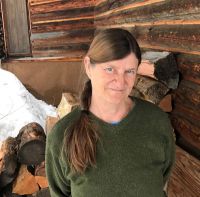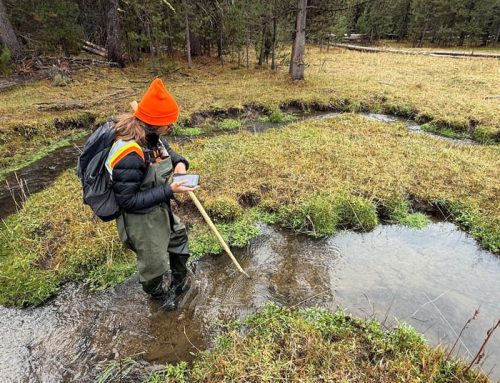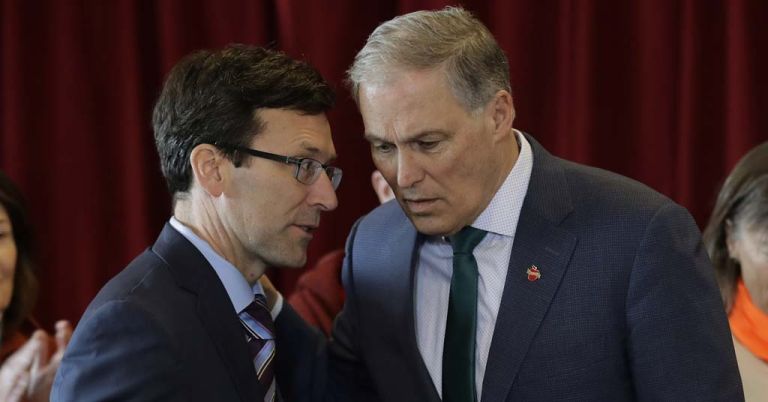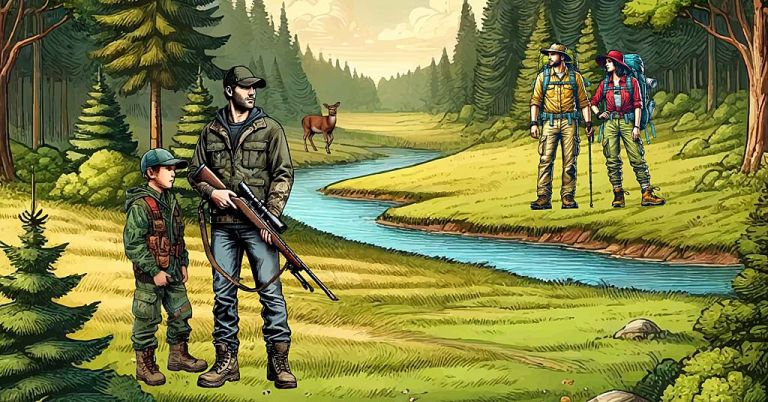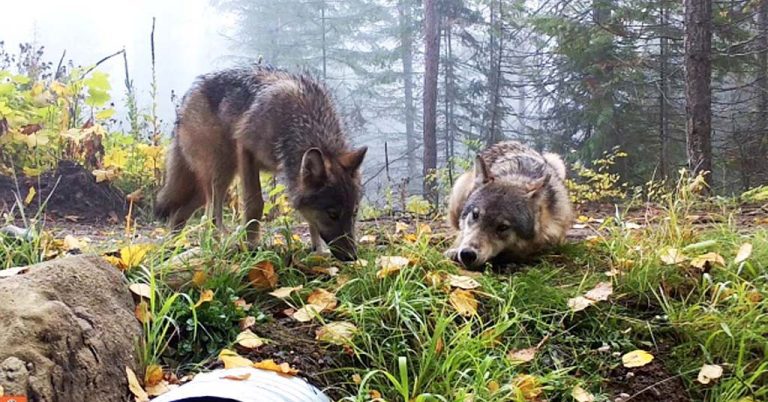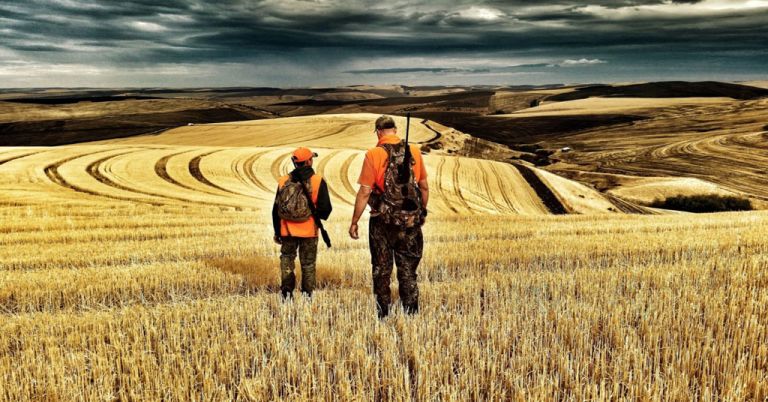“It doesn’t help when attacks become personal,” says Chair as WDFW Commission suspends debate to consult with Tribes
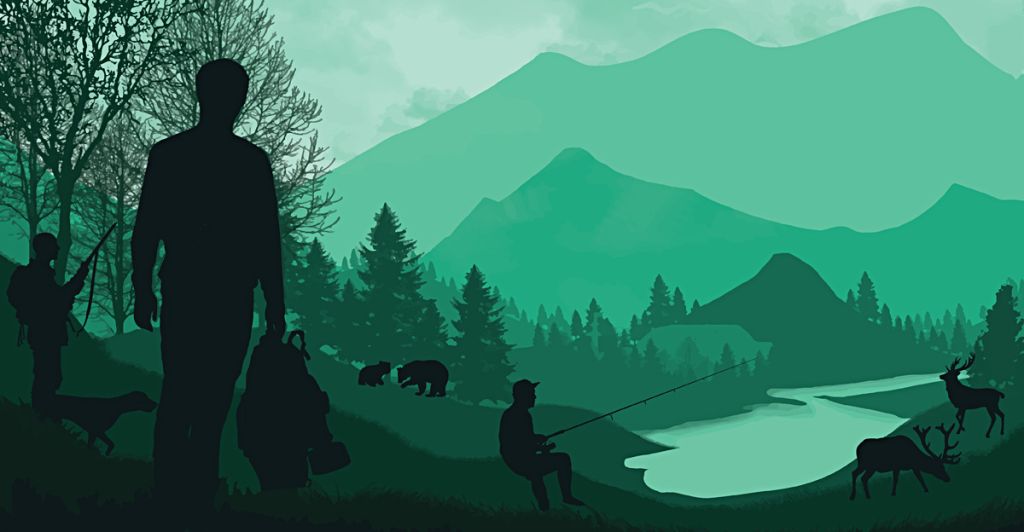
Peaceful out here: Indoors it’s a different story. Illustration: Mackenzie Miller
By K.C. Mehaffey. February 1, 2024. For years, the Washington Fish and Wildlife Commission has been struggling to formulate a draft policy that would update the state’s approach to fish and wildlife management.
Now that effort is on hold indefinitely after a request from several Native American Tribes in the state for formal consultation with the agency.
The request came just days before the Washington Fish and Wildlife Commission was prepared to vote on its conservation policy outlining the emerging challenges caused by climate change, human population growth and development.
The draft policy had gone through more than a dozen revisions over a three-year period, which has seen hunters pitted against environmental advocates at lengthy and contentious commission meetings.
Following a recent comment period, commissioners have been considering whether to adopt a slightly watered-down version of policy wording that removes some references to “preservation,” which some hunters see as a buzzword for reducing consumptive uses.
Instead of a goal for “proactively addressing current and emerging conservation challenges,” the newly revised version would seek to “sustainably manage fish and wildlife populations to meet the needs of current and future generations.”
“We have heard loud and clear from Tribes that they would like to engage in government-to-government consultation on this policy,” Washington Fish and Wildlife Commission Chair Barbara Baker told her Big Tent Committee on Jan. 25.
Too many people are trying to access the same resources.
Saying the state Attorney General’s Office recently had a meeting with tribal attorneys, Baker recommended dropping plans to vote on the most recent draft while the commission begins a new process to work on the policy with Tribes.
WDFW Director Kelly Susewind told the committee that as sovereign nations, Tribes are the state’s partners in natural resources management.
He said WDFW has a policy on how to consult with Tribes, and the state has an executive order and Centennial Accords that affirm that Tribes will be consulted. He strongly recommended a pause.
Although some commission members expressed hope that the consultation process can be brief, the committee and the rest of the commission readily agreed.
“I’ve got to think there are probably no better consultants on conservation than Tribes … so it seems right and natural that we would include them in developing this policy,” said Commissioner Steve Parker.
Tribal negotiations
The unusual request to consult directly with the commission on a WDFW policy, however, has raised new questions.
Commissioner John Lehmkuhl brought up the difficulty of individually consulting with 20-plus treaty Tribes as well as other Tribes in the state that have an interest in fish and wildlife conservation.
“It would be very difficult for us to come up with a cohesive conservation policy” if consulting with each tribe separately, said Lehmkuhl.

Under new management? Washington black bear. Photo: WDFW
Commissioner Melanie Rowland wondered if WDFW will be expected to consult with tribes on every policy, going forward.
“I just don’t know. I don’t know what the implications are and I think it needs to be more refined because of the precedent we are setting here,” she said.
Lisa Wilson, vice chair of the Northwest Indian Fisheries Commission, answered her question the next day at the start of a two-hour public comment period.
She told commissioners that Tribes were deemed co-managers in 1979, and only a few months ago the commission passed its first co-management policy.
“That was with the understanding that we’d get together on more things,” said Wilson. “The question’s been asked, ‘Are we going to have to consult on every policy?’ Well, you’re damn right, if it affects our treaty rights.”
Wilson said that the Tribes aren’t trying to hold up the process, and they don’t want to fight.
“It’s a tunnel-vision policy. Just stop hunting—whatever. But we’ve got to take into consideration a lot of other things,” she said. “What is the definition of conservation? It’s not just about the harvest. It’s about the resources that are needed to make sure that we all have this opportunity to be able to fish and hunt.”
Bullying, knives, guns, threats
In public testimony on Jan. 26, it became clear that the commission’s decision to put the conservation policy on a back burner hasn’t eased the controversy.
Hunters cheered the pause as a win, while environmental groups urged the commission not to drop their move for reforms.
Claire Davis, executive director of Washington Wildlife First, told commissioners about online bullying and comments that included a call for the hunting of wildlife advocates.

Claire Davis. Photo: Washington Wildlife First
She told them that at one of their packed meetings—when many people had been sent to an overflow room to watch the hearing—hunting knives were publicly displayed and there was audible discussion of concealed firearms.
“More than once, people have called for an open season on the commission,” said Davis, urging commissioners to take their personal safety seriously.
Tim Galde, a sportsman from Snohomish County, urged commissioners not to “take the bait … being thrown out by extreme activist groups claiming your lives and theirs are in danger.”
He said it’s inaccurate to judge the community of sportsmen by a few bad actors, and that sportsmen and women are also being threatened. Galde said many of the threats are coming through public forums, where there’s no verification of who’s sending them, or whether they’re real.
While many commenters were respectful, many more openly attacked unnamed commissioners or opposing groups.
Kelsey Ross, a resident of Camino Island, accused some commissioners of possible conflict-of-interest over a bear and cougar petition.
“I am quite concerned about the lack of integrity certain commissioners have, with their inability to question studies that haven’t passed peer review, using manipulation tactics to obtain more votes and a willingness to choose a biased selection of scientists over your own staff expertise,” she said.
Brandon Ross, of Island County, said he knows of evidence of leaked emails to special interest groups to give them a leg up during hearings.
“It is plain to see that the extreme bias of some of our commissioners is mixed with their egos and has made them blind. They have become blind to reason, blind to fact and blind to the very public trust doctrine that binds you as a public employee,” he said.
Ross likened some commissioners to small children when they don’t get their way.

WDFW Commission Chair Barbara Baker. Photo: WDFW
“All I see is a just group of individuals who are accountable to no one, and have no oversight. You are the definition of a kangaroo court,” Ross told them.
After calling for a day to “stop fighting,” Commission Chair Baker shared her concerns about the public testimony, noting that it’s becoming more “conflict laden” and that commissioners have become “cannon fodder right in the middle of several factions that are warring with each other.”
Concerns about this commission—which, unlike past commissions, isn’t dominated by anglers and hunters—are making their way into this year’s political agenda.
While it’s unlikely to pass, a bill was introduced in the Washington Legislature sponsored by State Rep. J.T. Wilcox, R-Yelm, that would disband the commission, and give all its duties to the WDFW director.
“We are trying to do the best we can to come up with solutions to problems which we don’t even fully understand—nor do I believe anybody else does—which is essentially too many people trying to access the same resources, too much conflict due to too many people in this state and a biodiversity issue that is not just looming, it’s here,” said Baker. “In the legislature, the kind of testimony that we heard today would have never been allowed. People would have been gaveled down.”
Baker said she hasn’t curbed speakers because she believes it would only create more conflict.
But she urged commenters: “Keep to the issues. Tell us why we’re right or wrong on whatever we’re doing. But it sure doesn’t help when these attacks become personal.

